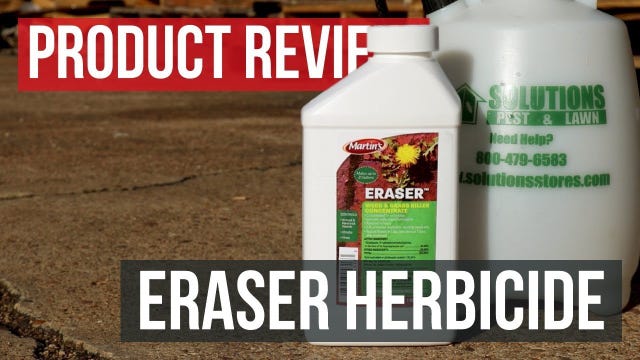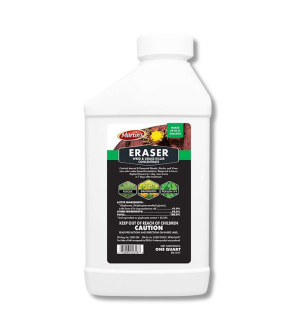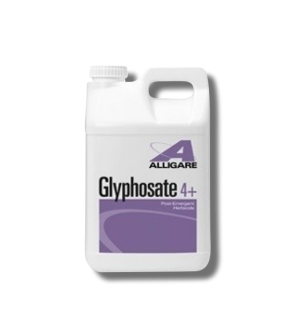Gain access to personalized product screening, the best pricing, rewards, and more!
Most Effective Products
Generic Glyphosate vs. RoundUp
One of the most popular chemicals for controlling problematic weeds on a lawn is Glyphosate. Glyphosate has been an essential tool for land managers or farmers looking to eliminate invasive weeds interfering with landscaping and agriculture.
The most popular glyphosate-based product is the brand RoundUp. Created by Monsanto, RoundUp is the best-selling herbicide in the world, and everyone from agricultural farmers to DIY homeowners uses its products.
While RoundUp is certainly effective in using Glyphosate to kill weeds, do generic Glyphosate alternatives to RoundUp stack up well against the name brand?
What is Glyphosate?

Glyphosate is an herbicide active ingredient that delivers non-selective control of invasive plants. The term “non-selective” means that the chemical has the capacity to kill or harm most plants it touches—whether weeds, grass, flowers, or trees.
Glyphosate must be absorbed through plant foliage (leaves, etc.) to work. Once it does, it travels through the plant's system to disrupt its development and essential processes until it breaks down and dies.
Glyphosate kills weeds in and around fences, trees, driveways, flower beds, walkways, shrubs, and lawns invaded by weeds to prepare for renovations and garden preparations.
When using Glyphosate, it's important to be careful not to spray your valuable and desirable plants since Glyphosate will kill most plants that absorb the product through the foliage.
RoundUp or Generic Glyphosate?

Glyphosate was first developed by Monsanto under its trademarked name for the chemical RoundUp. Monsanto's patent ownership of the Glyphosate formula expired in 2003. Various companies have now developed generic RoundUp brands, such as Eraser from Control Solutions and Glyphosate 4 by Alligare.
When it comes to efficacy, is RoundUp superior to these generic variations? Tests conducted by various institutions concluded that there are only minor differences between generic brands of glyphosate and Monsanto’s RoundUp.
If you were to ask lawn care experts (like us), we'd tell you that if you were to buy the more expensive name-brand RoundUp over a generic brand Glyphosate product, you'd mainly be spending the extra money on the brand label and packaging.
Generic brands work just as effectively as RoundUp and deliver the same weed control but at a more economical price. If you are on a budget, it would be wiser to go with a generic brand and save a few bucks.
Our Glyphosate Recommendations
Solutions Pest & Lawn carries both RoundUp and low-cost generic varieties. The brands that we highly recommend for weed control over RoundUp are Eraser 41% by Control Solutions Inc. and Glyphosate 4 Plus by Alligare.
Eraser, 41% Glyphosate, is better suited for small spot treatment applications conducted by homeowners to remove weeds from their lawns or driveways. If you are a lawn care professional or manage a large commercial property, Glyphosate 4 Plus is the best option for treating weeds using a professional spraying rig.
How to Use Glyphosate Products
Mixing and applying Glyphosate products is very easy. Before you proceed, however, it's important to be geared up for the task by wearing the proper personal protective equipment, such as gloves, eyewear, long-sleeved clothing, and a face mask.
Step 1: Measure Your Lawn Square Footage

Determine how much Glyphosate product you need by calculating the square footage of the area you wish to treat.
To do this, measure and multiply the area length times the width (length x width = square footage). For spot treatments of Eraser 41% Glyphosate, the label states 2.5 oz. of Eraser mixed in 1 gallon of water will treat 300 sq. ft.
For example, if you measured a treatment area that is 1,200 sq. ft., you would need to mix 10 oz. of Eraser in 4 gallons of water to treat the entire area.
Step 2: Mix the Eraser in a Sprayer
A handheld pump sprayer is the preferred piece of equipment because it helps you achieve more precise control and avoid as much drift as possible.
It’s also wise to label the sprayer as “non-selective” because you don’t want to mix the chemicals in the sprayer with a selective herbicide and potentially burn your yard in the future.
Fill your sprayer halfway with the required amount of water. Add the properly measured amount of Eraser 41% Glyphosate and then fill with the remaining half of the water. Close the sprayer lid and then shake the sprayer until the solution is well mixed.
Step 3: Apply the Eraser 41% Glyphosate to Target Weeds
Begin spraying the target area, keeping the sprayer low to the ground and close to the vegetation so it doesn’t drift. Try to spray on a day that is not windy.
If you are spraying in areas where you want grass or plants, you need to proceed with caution so you don't get the Glyphosate on them and damage the vegetation. Get the vegetation wet, but not to the point of runoff, as you don't want the chemical dripping onto other non-target plants.
If weeds are growing along cracks, keep your nozzle low and close to the ground and aim in a sweeping motion.
Step 4: Reapply As Needed
You should start to notice yellowing in just a couple of days, and within a week or two, the plants should be dead. If resistance exists or the plant is persistent, a reapplication may be necessary.
Key Takeaways
What is Glyphosate? What is Roundup?
- Glyphosate is a non-selective herbicide active ingredient designed to control unwanted vegetation on residential, agricultural, and commercial landscapes.
- Monsanto, the maker of the popular name brand RoundUp, developed glyphosate.
Glyphosate vs RoundUp
- While RoundUp is the original brand name, there are generic alternatives to RoundUp that are just as effective while being more economically priced, like Eraser 41% Glyphosate and Glyphosate 4 Plus Weed Killer.
-
Q:Is glyphosphate 41 stronger than round up? For landscape weeds we always mixed 6 oz of roundup per gallon and this year we bought a 2.5 gallon jug of glyphosphate 41 and I'm having a hard time determining how to mix it per gallon. You recommend 2.3 oz per gallon but if it's the same strength as Round up I feel like we would need more like 6 oz. per gallon...Thank you !4/6/24A:Glyphosate 41 is a little bit less active than Roundup Pro at 41% Glyphosate compared to Roundup's 50.2%, but when applied properly it is just as effective. Your mix rate will vary depending on which weed you're treating and the maturity level of the target weed. Generally, you can use between 0.7 and 13 ounces of Glyphosate 41 per gallon of water.
Colin Travis
4/15/24











